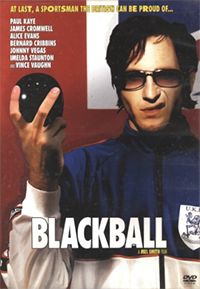Background: There was a time when the National Lampoon name held weight. It all started back in 1970 with a magazine, a nationwide offshoot of the Harvard Lampoon which had began publication a full century earlier. It was beloved throughout the '70s for pushing well past what was considered appropriate. The National Lampoon empire quickly expanded through the mid part of the decade to include books, live theater, radio, etc. Most notably though, they also started making movies. 1978 saw the release of their first, and probably still best, movie Animal House. A few years later came National Lampoon's Vacation, which gave rise to other, crummier sequels. Eventually, after all the original editors had long since taken expensive buyouts, the magazine's popularity declined. It struggled through financial troubles through the '80s and '90s until it printed its final issue in 1998.
Since then, another company has emerged, called National Lampoon Inc. Founded in 2002, it sought to make the National Lampoon brand relevant again. They quickly scored a hit with the Ryan Reynolds vehicle Van Wilder, so they made more college comedies. Dorm Daze, Barely Legal, and a sequel to Van Wilder are among the lowbrow, direct to DVD movies they've made since the company formed, which brings us to today's entry from The Depths, Blackball from 2003.
The movie features big names like Vince Vaughn and James Cromwell, but still barely saw a release in America.
Plot: Cliff Starkey is a brash, young lawn bowling prodigy from England. That may not seem like a big deal, but in the world of Blackball, Bowls is king. Cliff is loud and vulgar, and this offends other bowlers, as it is traditionally a proper game played by old people. His hijinks start when he yells "Tosser" at the stuffy head of the Bowls club and main antagonist for most of the movie, Ray Speight (James Cromwell). The other antagonists are the Australian national Bowls team. They've already taken down South Africa and America, and Starkey immediately thinks he can beat them no problem. Starkey also has a fat friend, whom I will refer to as only "Fat Friend". His only role in the movie is to be the Fat Friend, including a "joke" where the camera zooms in on his jiggling belly.
In order to have the right to play for the England national Bowls team, he first has to win a local tournament. His first opponent was described as "Young" and "Dangerous", but he is instead in his mid forties and smokes a funny looking pipe. He takes them down in short order. His showy antics quickly catch on with the crowd (way too quickly to be believable, really), and he has them going crazy throughout the rest of the tournament. The final match is against Ray Speight, naturally, and Starkey comes out with a marching band playing the Rocky theme, albeit quite poorly. Starkey wipes the floor with him. One problem though, on his scorecard he writes "Ray Speight is a tosser". this vulgarity gets him banned from the sport for 15 years.
The ban makes big news around England, grabbing headlines in The Times and other big papers. As his star rises, he's contacted by a sports agent played by Vince Vaughn. This story goes exactly nowhere and by the end of the film, Vaughn is no where to be seen. In the meantime though, Starkey signs a big contract and plays exhibition Bowls on television. Through his stardom, he hurts Fat Friend emotionally, and his father figure gets hurt physically.
All this leads to his eventual reinstatement into professional bowls so he can play the Aussie team. Cliff's partner on the team? Speight, of course. Those two really hate each other now due to a scandal involving Cliff dating Speight's daughter. That whole plot line was awful, so I tried to avoid it. Cliff struggles at first and the Aussies jump out to what seems to be an insurmountable lead. Of course though, Cliff gets his groove back, England wins the championship and everyone lives happily ever after.
Why Was It Forgotten? The plot of the movie is basically that of Happy Gilmore. A rough young guy trying to break into the world of a button up sport. All the other players hate him, but all the fans love him. It doesn't have anywhere near the charm though. Sure, Adam Sandler's idiot manchild schtick isn't without its faults, but at least he was looking out for other people. He was playing for his grandma and his mentor, but Starkey plays most of the movie purely for himself, and that lack of compassion makes for a much less interesting character.
There's also the angle of making a small sport big. Like Dodgeball: A True Underdog Story, it takes a silly little game with no real competitive base, and creates a universe where it's immensely popular, with big sponsorships and national television deals. However, as with the last comparison, it's way worse. Dodgeball acknowledges its silliness by putting it on ESPN 8, but there's no sign of either wink or nod in this movie. There are further eerie similarities with Dodgeball, including a sudden death round involving a silver ball.
Also, Fat Friend sucks.
What Went Right? Though it may pale in comparison to other movies like it, there are some good jokes to be found in the movie. The strange world that's been created where popular newspapers will have top headlines about Bowls is fun to spend some time in. Also, even though I went into the movie with only a vague knowledge of lawn bowling, a good licensed soundtrack (songs from Queen and The Who) actually manages to make the low key sport interesting and fun to watch. It's a shame that the actual games are so few and far between.
Verdict: The National Lampoon name is far from resurrected.


No comments:
Post a Comment